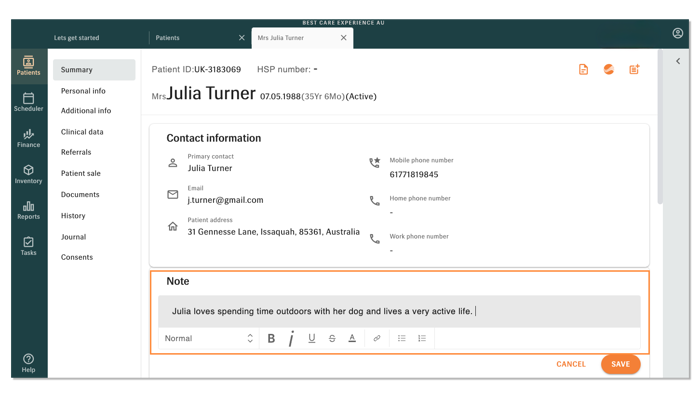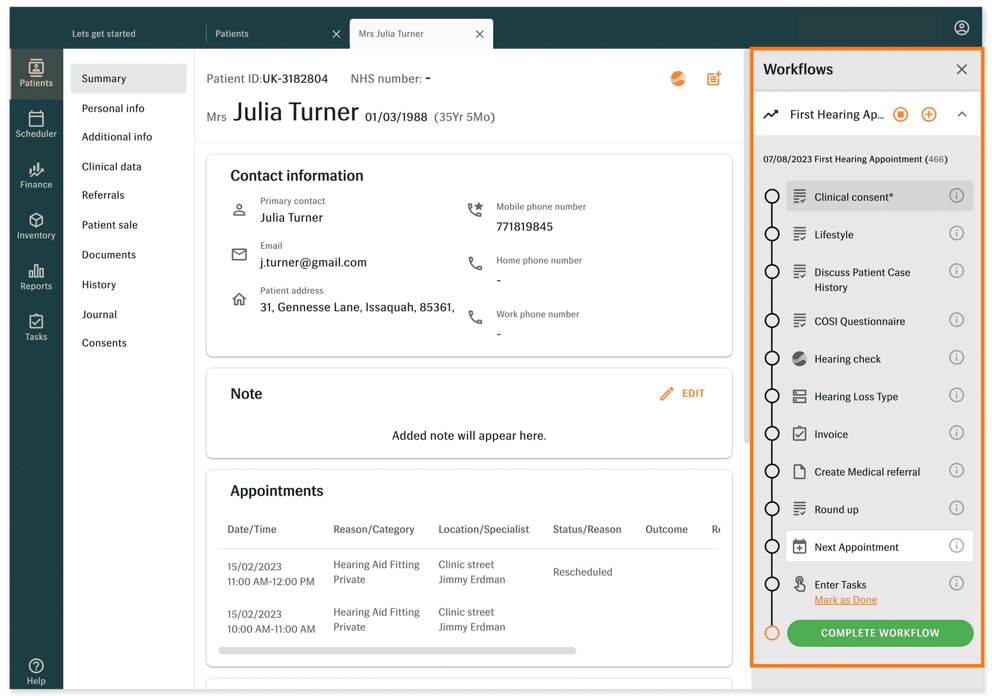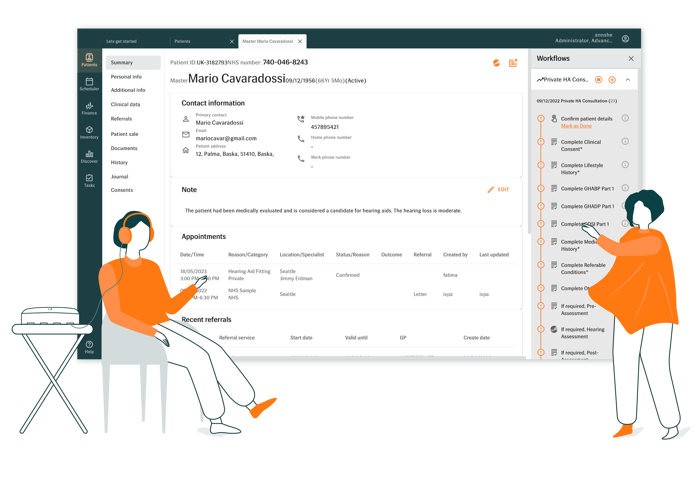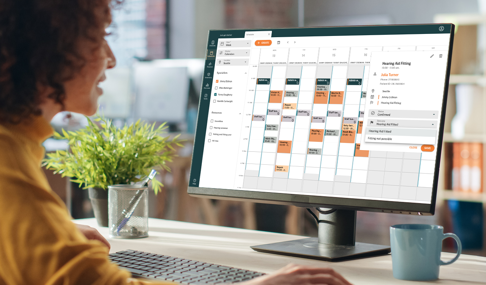
Your front office employees can dramatically influence patients’ overall experience at your hearing clinic. When your front office employees are kind, friendly, compassionate, and professional, patients are likely to have a positive experience at your hearing practice – and are more likely to return and recommend your clinic to others. And, of course, the opposite is also true. If your front office team is rude or dismissive, patients – especially new patients – are more likely to be dissatisfied with your audiology practice overall.
To provide a best care experience throughout each patient’s entire journey, your staff should start by providing exceptional care from the beginning. Since most patients’ journeys begin by interacting with your clinic’s front office staff, these employees play an essential role in the patient experience.
Make a Good First Impression

Whether patients are calling to make an appointment or coming into your hearing practice after booking an appointment online, their first in-person interaction with your employees should be positive and welcoming! The employees at the front desk should greet each patient warmly, and should be friendly, professional, helpful, and courteous from that initial touchpoint.
The receptionist should immediately welcome each patient, ask for their name, and sort out any paperwork that needs to be completed. (Ideally, any registration forms and/or patient records should have been completed online before the patient even arrives onsite.) Your clinic should be using Practice Management Software (PMS) to optimize operations, maximize efficiency, and streamline scheduling, ensuring there’s minimal wait time between each patient’s arrival and when they see the hearing care provider for their appointment.
Front-office employees play a critical role in turning new patients into returning patients. Retention is important, especially when you consider that it can cost as much as $300-800 per patient to obtain a new lead.
The patient experience is impacted by the entire hearing clinic team, not just the audiologist, so everyone in the practice should go “above and beyond” for the patients during each phase of the patient journey. Every patient interaction with the front office staff should be extraordinary, starting from the time the patients call the front desk or walk through the front door.
Create a Warm, Welcoming Environment

Recognize that patients may feel anxious or uncomfortable when they arrive at your hearing clinic, so it’s important for your front office team to do everything they can to put patients at ease. And that starts by creating a comfortable environment from the moment the patient steps into the clinic.
The waiting area should be clean and inviting, with comfortable places to sit. The receptionists should immediately acknowledge each patient’s arrival, smile and make eye contact, then offer to check them in and get them settled. The front office staff should be trained to communicate effectively with individuals with hearing loss.
The receptionist should show patients where they can hang their coats, where the restrooms are, and where they can help themselves to refreshments, like coffee or water. They should also indicate where patients and their loved ones can find reading materials, such as newspapers and magazines to enjoy while they wai.
Your front office staff should maintain the waiting area, keeping it clean and organized. Part of their responsibility should be to continually monitor the area and throw away coffee cups and other trash, and straighten up the magazines and newspapers. Patients that come in midday should experience a fresh, clean reception area, just like the first patients of the day.
Provide a Pleasant End to The Visit

The front office employees are also each patient’s last point of contact after their hearing exams, and should ensure that the last touchpoint is as pleasant and stress-free as possible. The receptionist should ask if everything went well, and perhaps compliment the patient’s new hearing aids.
At the end of each visit (or phone call), the front desk staff should book the next appointment, as necessary, ask patients if they need additional assistance, thank them, reiterate how much the practice appreciates them, and say a warm goodbye.
As the clinic’s staff builds relationships with the patients, the receptionist should reference notes in the patient records section of the PMS to mention things like the patient’s family, hobbies, recent trips, or other items of note. Building a rapport with patients over time – and remembering details about their grandson’s passion for soccer or their love of knitting or golf – can help patients feel valued and appreciated.
These seemingly small details can have a huge impact on patient satisfaction and retention, and help contribute to the Best Care Experience that you’re working to provide every day, with every patient.
Auditdata Manage
Use Notes In Manage To Build a Rapport With Patients
In Manage, under a patient's tab you find Notes, where you include information related to accessibility, details about hearing aid consumables, or if a patient requires additional time. This section can be edited and removed as needed.

How to Improve The Front Office Experience

You recognize that the front office staff – and environment – play a pivotal role in the patient experience. Now, learn how to increase patient retention, enhance the patient journey, and improve interactions with your own front-office team by implementing these nine tips:
1. Train Your Receptionist
Your hearing clinic has spent significant money to hire specially trained audiologists, invest in the most technologically advanced audiology equipment, market your business, and work diligently to generate leads just to get the phone to ring in the first place! So, when people call, you want to be sure the person answering the telephone is not only polite and professional, but is also experienced and properly trained to answer their audiology-specific questions.
It’s inevitable that your receptionist and front office staff members will get bombarded with questions – both on the phone and in person – so it’s essential to provide them with appropriate answers and messaging for common inquiries. For instance, when patients or prospects ask how much hearing aids cost, the answer is complicated and depends on numerous factors. Therefore, it’s impossible for someone at the front desk to answer that question.
Ideally, your front office staff can use Practice Management Software (PMS), which has customizable workflows that you can set up to walk the receptionist through a series of steps, in the correct order, so nothing is missed or forgotten in the administrative sequence of events. That way, even if a patient or prospect has many questions that could take a conversation off-track, the receptionist will stay the course and be sure to follow the proper workflow, scheduling appointments correctly.

2. Automate Front Office Tasks
If audiology practices are still using manual processes, their front office employees are spending excessive time booking and confirming appointments. Handling these tasks manually is tedious, time-consuming, error-prone, and inefficient. Additionally, it can be quite frustrating for patients, who often must wait by the front desk to be greeted and helped by your employees, who are wasting significant time on manual processes. If your clinic hasn’t already transitioned to comprehensive, fully-featured Practice Management Software (PMS), it’s time to make that switch!
A PMS will make your employees’ lives so much easier, allowing them to streamline scheduling, automate appointment reminders, and spend more time providing Best Care Experiences to your patients. Additionally, when you enable online booking, you can reduce no-shows and easily fill open appointment slots from last-minute cancellations.
Watch the video below and see how to book an appointment in our PMS, Manage.
3. Hire Professional, Polite Front Office Staff
Your clinic’s receptionist is more than just a person answering a phone.The way your receptionist answers these questions contributes directly to patient retention, which represents an astonishing 50-70% of audiology practice revenues.
The other 30-50% of incoming phone calls to an audiology practice are typically new or potential patients, which are absolutely essential for the continued growth of a practice. This illustrates how important it is that the person answering the phone be professional, polite, well-trained, knowledgeable, and comfortable with your practice’s systems, processes, scheduling, and key messages.
Hiring the right front office staff starts with identifying soft skills like empathy, communication, and calm under pressure.
Look for candidates who are personable, organized, and quick to learn new systems. A short role-play or test call simulation can help assess tone, clarity, and problem-solving on the spot.
To find high-quality candidates, consider platforms like Indeed, ZipRecruiter, or your local healthcare job boards. Look for applicants with prior experience in medical or customer service roles, but don’t underestimate a great attitude and willingness to learn, especially if you have solid training processes in place.
4. Emphasize The Importance Of Accuracy And Responsibility
Your front office staff should always get complete and accurate information from patients, both on the phone and in person. Any inaccuracies can cause errors in patients’ records and complicate billing and reimbursement.
Even “small mistakes” can delay reimbursement for months, which could anger patients and decrease their confidence in your staff (and your practice). It’s also critical that your administrative employees are careful and accurate when scheduling (or rescheduling) and relaying appointment times to patients, to ensure that patients show up on the right day and time, at the correct clinic location.
5. Encourage Loved Ones To Join Patients At Appointments
Did you know that converting a lead into a new patient can improve by 40% if the patient is accompanied by a spouse or significant other during the initial hearing consultation? Therefore, when booking appointments, receptionists should encourage patients to bring their spouse, partner, or other loved one along to the hearing clinic.
Also, patients are far more likely to purchase hearing aids if their spouse or partner has accompanied them to the hearing clinic, with only 25% buying a hearing aid without a companion present but 80% purchasing the devices when their spouse or significant other joined the appointment. That’s a huge increase! If you think about it, most people wouldn’t make a significant purchase without consulting their spouse or partner first.
So, if a patient comes to your hearing clinic alone, they’ll want to go home and discuss the purchase with their loved one, which could delay their hearing aid purchase indefinitely. However, if the patient brings their spouse or partner to the appointment, they’re much more likely to make an immediate decision to buy a hearing aid on the spot. Therefore, the front office staff should encourage patients to bring their loved ones to their appointments to help increase your hearing aid sales and conversion rates.
Watch the video below and learn how to use our Practice Management Software, Manage, to set up alternate contacts.
6. Leverage Your Front Office Employees’ Special Skills
Here’s the conundrum in many hearing clinics: you want your audiologists to concentrate on providing clinical care, so you delegate more tasks to your administrative staff. But you don’t want to overwhelm your administrative team with too much work because they’re busy handling important responsibilities like scheduling, billing, confirming appointments, greeting patients, etc. So, what should you do? One helpful tip is to leverage your employees’ special skills, interests, and superpowers, allowing them to do what they like – and what your clinic needs.
For instance, if one of your front office employees is amazing with social media, put them in charge of managing your clinic’s social media platforms. If your receptionist loves to decorate, ask them to spearhead the holiday and seasonal décor to keep your clinic looking festive all throughout the year. If another admin employee does photography as a hobby, ask them to update the staff headshots for the website, and take photos of your audiologists at community events for your social media posts. Delegating tasks based on employees’ interests allows them to do things they love, which increases their job satisfaction.
Auditdata Manage
Optimize Your Clinic with Auditdata's Guided Workflows
Streamline clinical operations with one-click access to all functions, making it easy for your staff to navigate through the different steps across the entire platform. Standardize appointments for optimal outcomes, while customizing workflows to match your practice needs.

Get more with Auditdata Manage
Our software for hearing care professionals simplifies practice management, empowering hearing care professionals as they care for others.
Patient Management
Streamline administrative tasks to focus on providing the best care possible to your patients.
New AI-Powered Notes
Automate note-taking with AI so you spend less time typing and more time with patients.
Guided Activity Workflows
Simplify and standardize tasks with step-by-step workflows, ensuring consistent, high-quality care every time.
Billing & Payments
Make invoicing and insurance claims faster and easier with automated billing tools.
Insurance & Reimbursements
Follow country-specific insurance rules for the United States, United Kingdom, and Australia—covering claim formats (CMS-1500, NHS, HSP).
Security & Compliance
We have partnered with Microsoft to give you the most secure and accessible cloud service in the world.
Integrations
Connect your favorite tools and systems to create a smoother workflow, reduce manual tasks, and keep everything in sync.
Other Blogs You Might Enjoy:

9 Proven Tips to Improve Time Management in Hearing Practices
Time management skills in healthcare are critical because your staff is dealing with people’s well-being. In audiology, you’re always busy, and must work diligently and continuously to provide exceptional care and outstanding customer service. This blog outlines 10 proven tips to improve your time management skills and make the most of each day.

11 Tips To Find, Recruit And Hire The Most Amazing Audiologists
If your hearing clinic is looking to hire a new audiologist, you will likely face increased competition since audiologists are so highly in demand. So, how do you set your practice apart from the others and find the perfect fit for your clinic? This blog outlines 11 foolproof tips to attract, recruit, and hire the most amazing audiologists.

9 Proven Ways To Prevent No Shows And Last-Minute Cancellations
Hearing practices with efficient schedules typically perform better clinically and financially than practices with inefficient schedules and frequent no shows. This “seemingly small detail” really matters, since patient no shows and last-minute cancellations result in wasted time, money, and effort. This blog outlines 9 tips to reduce these no shows.
Resources
⭐️ Auditdata Manage - Practice Management Software
⭐️ 9 Smart Ways Your Audiology Hearing Clinic Can Improve Customer Relationships
⭐️ Tips & tricks on making a good impression
⭐️ 9 Effective PMS Features that Every Hearing Clinic Should Use
⭐️ 9 Tips to Becoming a Scheduling Rock Star
⭐️ 3 Rules for Patient Care Coordinators in a Hearing Care Office